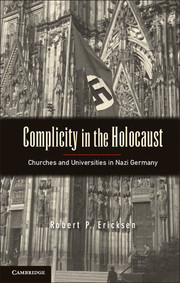Book contents
8 - Implications
Published online by Cambridge University Press: 05 June 2012
Summary
Much of the story told here was slow to develop. Postwar German churches and church leaders benefited from the horror with which the world viewed the smoking camps and the piles of dead bodies in 1945, as well as from the human need to find light in the darkness. Thus, they were able to create a myth in which they had been brave and long-suffering, moral opponents and also victims of the Nazi state. This myth lasted into the 1980s, and in some quarters it lingers still. However, an early generation of scholars – people such as John Conway, and Klaus Scholder, Guenter Lewy, and Ernst Helmreich – began to scratch at the surface of the falsified story. Two generations of scholarship since the 1980s have produced a flood of material that undergirds the arguments about churches made in this book. I include my own work, along with that of scholars such as Gerhard Besier and Clemens Vollnhals, Hartmut Lehmann and Manfred Gailus, Susannah Heschel and Doris Bergen, Donald Dietrich and Michael Phayer, Victoria Barnett and Kevin Spicer. The list goes on, fortunately, and we continue to benefit from the light directed into dark corners.
A similar pattern can be found in the history of universities in Germany. Faculty in those universities controlled the postwar process of historical scholarship for a generation or more, so that the study of the Nazi regime focused on safer subjects outside the academy. German scholars quickly produced good historical work on those people and institutions that were dead and gone: Adolf Hitler, Heinrich Himmler, the Nazi regime itself, the SS, and the SA. They chose not to turn their gaze upon themselves, so that the history of universities and the history of scholarly disciplines did not gain traction until the 1980s. Since then, however, there have been a growing number of honest young scholars looking at the problems within the universities described here.
Information
- Type
- Chapter
- Information
- Complicity in the HolocaustChurches and Universities in Nazi Germany, pp. 229 - 236Publisher: Cambridge University PressPrint publication year: 2012
